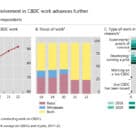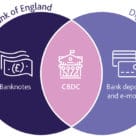13 news stories.
• Should Bank for International Settlements (BIS) be in the NFCW Expo? Is this your organisation? Find out how to get your NFCW Expo showcase.
• Should Bank for International Settlements (BIS) be in the NFCW Expo? Is this your organisation? Find out how to get your NFCW Expo showcase.

One in four central banks are now piloting a retail central bank digital currency (CBDC) that consumers would be able to use to make payments, a survey of central banks around the world conducted by the Bank for International Settlements (BIS) has found... More

The Bank of Korea (BOK) is to review additional central bank digital currency (CBDC) design options after its 10-month experiment to test a retail CBDC based on distributed ledger technology (DLT) revealed “limitations of scalability” such as slow processing times during periods of high transaction volume when compared with a more conventional centralised ledger database, the bank says... More

The Hong Kong Monetary Authority (HKMA) has unveiled a prototype two-tier central bank digital currency (CBDC) ecosystem that will enable end users to store digital HK dollars as either intermediated CBDC tokens or CBDC-backed stablecoins in a digital wallet and use them to carry out retail transactions... More

Providing a cash-like digital means of payment, increasing private digital payment services, supporting financial inclusion and achieving greater payment system efficiency are among the key motivations driving initiatives to develop central bank digital currencies (CBDCs) in emerging market economies around the world, according to a Bank for International Settlements (BIS) report... More

Consumers in key markets around the world have switched from physical cash to digital and contactless payment methods at “a rate unprecedented” since the Bank for International Settlements (BIS) launched its Red Book of payment and settlement statistics in 2004, BIS says... More

Around 100 countries are now exploring the potential development and issuance of a central bank digital currency (CBDC), and the challenges and opportunities identified by these research projects reveal a need for “increased international information-sharing of insights learned”, according to an International Monetary Fund (IMF) report... More

Chinese e-commerce platform Meituan is to enable customers of its bicycle hire service to pay for their rides with the country’s central bank digital currency (CBDC) while offline using an NFC-enabled digital yuan hard wallet... More

The UK Treasury and the Bank of England have established a central bank digital currency (CBDC) taskforce to coordinate research into the benefits, risks and practicalities of introducing a digital pound... More

Countries with digitised and innovative economies are more likely to be developing central bank digital currency (CBDC) projects while those with a larger informal economy are tending to focus on creating retail CBDCs, a working paper published by the Bank for International Settlements (BIS) reports... More

The pandemic may result in increased calls to defend the role of cash, moves towards more quickly introducing central bank digital currencies and a structural increase in the use of mobile, card and online payments, a Bank for International Settlements (BIS) research bulletin analysing the likely impact of Covid-19 says... More

The Bank of Canada, the Bank of England, the Bank of Japan, the European Central Bank, the Sveriges Riksbank and the Swiss National Bank, together with the Bank for International Settlements (BIS), are to work together “to assess potential cases for central bank digital currencies”... More
Cryptocurrencies: looking beyond the hype — Bank for International Settlements — “Cryptocurrencies promise to replace trusted institutions with distributed ledger technology. Yet, looking beyond the hype, it is hard to identify a specific economic problem which they currently solve. Transactions are slow and costly, prone to congestion, and cannot scale with demand. The decentralised consensus behind the technology is also fragile and consumes vast amounts of energy. Still, distributed ledger technology could have promise in other applications.”
Central bank cryptocurrencies — Bank for International Settlements — “New cryptocurrencies are emerging almost daily, and many interested parties are wondering whether central banks should issue their own versions. But what might central bank cryptocurrencies (CBCCs) look like and would they be useful? This feature provides a taxonomy of money that identifies two types of CBCC — retail and wholesale — and differentiates them from other forms of central bank money such as cash and reserves. It discusses the different characteristics of CBCCs and compares them with existing payment options.”